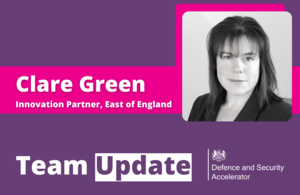Clare Green joins DASA as Innovation Partner for East of England
News story
Introducing DASA’s new Innovation Partner who will work with suppliers in the East of England

DASA are pleased to appoint Dr Clare Green as the new Innovation Partner for the East of England. Clare will meet with suppliers in the region to learn more about their innovations and to provide advice and guidance on DASA, and wider government, opportunities.
Clare’s career to date has spanned both large industry and SMEs, as well as knowledge exchange roles within the HEI sector. She joins us from an academic environment where she worked as a Technology Innovation Manager in a multi-university Research England-funded Connecting Capability Fund (CCF). In this role, she provided support to the projects teams to help de-risk their technology, determine the market need and competitor landscape as well as helping to secure innovation funding to demonstrate the concept and provide a route to market.
Clare also has experience in facilitating collaboration between companies, engineers, scientists and clinicians to develop innovative technologies with a medtech and biotech focus. These are very broad sectors and include personalised medicine, tissue-engineering, medical devices, diagnostics, digital health and the application of machine learning and artificial intelligence to improve healthcare pathways.
Clare said:
I am passionate about embedding commercial focus and translational skills within project teams and get a great deal of satisfaction from seeing developments move through the technology readiness levels (TRLs) and from playing a key part in enabling early-stage ideas to pass through the critical proof of feasibility and demonstrator stages so they are investor-ready.
I am delighted to be the new Innovation Partner for the East of England region, which is special to me as I was born in Cambridge and then returned there to study for my BBSRC-funded Industrial PhD in Molecular Biology. This important economic region is a rich source of innovative technology solutions with tremendous potential to address a number of vital unmet needs for our UK defence and security end-users. Helping to turn these ground breaking ideas into exploitable innovations, which will make our world a safer place, and build UK prosperity, is a very exciting prospect. I am particularly looking forward to identifying and working with entrepreneurs who may not have worked with Government before and have not yet been able to realise the full potential of their innovations.
DASA’s network of regional Innovation Partners is available to give advice to suppliers about their ideas and how they can best engage with DASA. Find out more.
Published 24 August 2021

